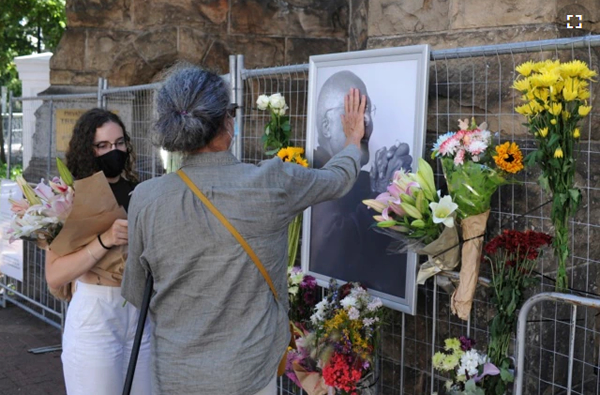
The world is reflecting on the legacy of South African anti-apartheid icon Archbishop Emeritus Desmond Tutu, who died Sunday. The Nobel Peace laureate was known worldwide as a champion of human rights.
Archbishop Emeritus Desmond Tutu is being remembered for his efforts in transforming South Africa into the free Rainbow Nation it is today.
“The Arch” as he was known, died at the age of 90 in Cape Town.
Tutu’s peaceful activism against the country’s apartheid government is ttributed to the avoidance of widespread conflict.
As chair of the country’s Truth and Reconciliation Commission, he showed the world resolution could be attained without violence.
Pumla Gobodo-Madikizela is the research chair in historical trauma and transformation at Stellenbosch University in South Africa.
“After so much tragedy, after so much violence, that sense of hope, that sense of possibility that victims and perpetrators can actually engage in a dialogue, in a way that is much more hopeful than what a vengeful kind of approach offers; that is the legacy of Archbishop Desmond Tutu,” she said.
Tutu was awarded the Nobel Peace Prize in 1984 for his activism.
The international recognition Tutu received never changed his values of equality and public servitude.
Imtiaz Sooliman is chairman and founder of the charity Gift of the Givers and worked with the archbishop.
“When we visited him in Cape Town for the first time, you have this feeling you’re coming to this great man, you know, and how are you going to approach him? He was so easy when you walked in — simply dressed, simple office, such humility…. He was so warm and the embrace that he gave us was so gentle and so caring, you could just see this man exuding love all over,” he said.
Tutu was unaffected by political affiliations as well.
He continued campaigning for equality long after South Africa became a free democracy.
Gobodo-Madikizela says Tutu applied the same scrutiny to the now-ruling African National Congress as he did to apartheid leaders.
“Right after the leadership of Nelson Mandela, he again continued as that voice that was reminding the post-apartheid leaders about the promise of freedom for everybody,” she said. “When he could see that they were leading in a way that was self-serving, he called them out…. His boldness, his moral stature allowed him to do that.”
Gobodo-Madikizela says his criticism fell on deaf ears among many in the ruling party that underwent a national corruption inquiry this year.

Tutu’s campaign to tackle extreme inequality with a wealth tax also remains unfinished. Experts say his death is a moment to reinvigorate the public to take on issues he was passionate about.
June Bam-Hutchison is a researcher with the Center for African Studies at the University of Cape Town.
“The one thing that we’re sort of losing grip on in the everyday is the values, the values of peace, of anti-violence, of an inclusive anti-racism, and non-racialism. … And we need to be reminded now that we’ve lost to Archbishop Tutu that we need to revisit those principles,” she said.
From the head of the African Union to the Dalai Lama, leaders worldwide have been sharing tributes calling Tutu an inspiration to the world.
He is survived by his wife, children, siblings and their families.
Source: voanews.com























